|
|
|
Sort Order |
|
|
|
Items / Page
|
|
|
|
|
|
|
| Srl | Item |
| 1 |
ID:
137950


|
|
|
|
|
| Summary/Abstract |
On 14 February 1945, King Abdul-Aziz ibn Saud of Saudi Arabia stepped aboard the USS Quincy, anchored in the Great Bitter Lake in the Suez Canal, to meet the dying American president, Franklin D Roosevelt. Roosevelt was returning from Yalta where, with Joseph Stalin and Winston Churchill, he had decided the fate of the post-war world. Roosevelt and Ibn Saud had a convivial discussion for several hours before going their separate ways.
|
|
|
|
|
|
|
|
|
|
|
|
|
|
|
|
| 2 |
ID:
137943
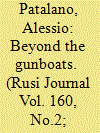

|
|
|
|
|
| Summary/Abstract |
In East Asia, the coercive use of maritime capabilities has led some to argue that the return of gunboat diplomacy has become inevitable. The use of coercion and deterrence there are indeed undeniable. However, Alessio Patalano argues that there is more than gunboats to diplomacy in a self-aware maritime East Asia. Capable navies can offer a significant contribution when dealing with major natural disasters, and these deployments should be regarded as diplomatic missions aimed at building relations and enhancing regional security. Japan's experience in this regard provides a relevant case in support of this argument.
|
|
|
|
|
|
|
|
|
|
|
|
|
|
|
|
| 3 |
ID:
137944


|
|
|
|
|
| Summary/Abstract |
In an era of international relations that is increasingly characterised by complexity and uncertainty, as well as a growing domestic reluctance to become ‘entangled’ abroad, the military options for political leaders in dealing with emerging crises appear to be dwindling. However, in this article Peter Roberts avers that there is one element of the British armed forces – its amphibious capability – that is relatively under-used as currently configured. If transformed into smaller, more frequently forward-deployed and capable units, amphibious forces could offer politicians an alternative option in crisis situations, and especially in those that emerge in the complex environment of the littoral.
|
|
|
|
|
|
|
|
|
|
|
|
|
|
|
|
| 4 |
ID:
137949


|
|
|
|
|
| Summary/Abstract |
As the Great War entered 1915, the stalemate continued unabated on the Western Front. In an attempt to force the Central Powers’ hand, Winston Churchill – then First Lord of the Admiralty – developed plans to drive the Ottomans out of the war and, potentially, to bring Greece and Bulgaria in on the side of the Allies. He proposed a naval attack on the Dardanelles, which would expose Istanbul and open up a supply route with Russia.
|
|
|
|
|
|
|
|
|
|
|
|
|
|
|
|
| 5 |
ID:
137948
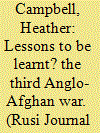

|
|
|
|
|
| Summary/Abstract |
At the end of the Third Anglo-Afghan War, the British government in the metropole and the British-led Indian government found themselves at odds in their interpretation of the political situation in Afghanistan, leading them to pursue different policies towards this difficult interlocutor. Heather Campbell analyses the primary sources documenting the difficulties of this decision-making process, and suggests that a sound knowledge of history may be a useful foundation for policy-makers seeking to shape the future of the UK's relationship with Afghanistan.
|
|
|
|
|
|
|
|
|
|
|
|
|
|
|
|
| 6 |
ID:
137942
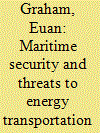

|
|
|
|
|
| Summary/Abstract |
Southeast Asia contains some of the world's busiest and most strategic chokepoints for maritime commerce, making it a sub-region of global strategic interest. Yet the vital energy shipments through the region are subject to potential disruption caused by maritime safety challenges, legal-passage regimes, piracy and terrorism, and inter-state conflict. In addition, potential counter-trends could transform the prevailing eastward flow of energy from the Gulf, via Southeast Asia, to the major East Asian importing countries. Nonetheless, Euan Graham argues, the security of maritime shipments in Southeast Asia and its extended region is surprisingly robust, while the energy trade itself is evolving dynamically in response to shifting patterns of supply and demand.
|
|
|
|
|
|
|
|
|
|
|
|
|
|
|
|
| 7 |
ID:
137946


|
|
|
|
|
| Summary/Abstract |
At the root of the West's conventional military dominance lie investment in and the operationalisation of advances in science and technology (S&T). However, with the funding behind this long-held military edge now being scaled back as part of a wider austerity drive, it is ever-more important that governments invest their money wisely and that new technology is operationalised as effectively as possible. John Louth and Justin Bronk draw on interviews with policy-makers, industry figures and military personnel as well as novel-technology case studies to argue for the ‘operationalisation’ of uncertainty in the early design stages of capability planning, thereby allowing for the inclusion of mature technology at a much later date.
|
|
|
|
|
|
|
|
|
|
|
|
|
|
|
|
| 8 |
ID:
137945
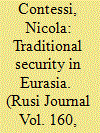

|
|
|
|
|
| Summary/Abstract |
The brewing conflict over the division of resources located in the Caspian Sea has long been cited as a driver of the growth in naval capabilities of the five littoral states. However, to focus on this aspect would be to neglect the political and diplomatic advances of recent years, as well as other local and global geopolitical factors that have contributed to increased tension. Nicola Contessi explores the intricate dynamics at play in the region and the ongoing efforts to unpick them, arguing that while the 2014 Astrakhan Summit did not herald the breakthrough hailed by the five participants, it did mark a step towards resolution.
|
|
|
|
|
|
|
|
|
|
|
|
|
|
|
|
| 9 |
ID:
137941
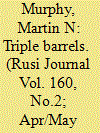

|
|
|
|
|
| Summary/Abstract |
With the economic rise of powers such as China that wish to reinterpret the global order underpinning trade and international law, there is renewed requirement for Western navies to think about how maritime power can contribute to the protection of commerce in the twenty-first century. In this article, Martin N Murphy explores the intersection that is now evident between economic, financial and maritime warfare, assessing how maritime power can once again be used in the exploitation of economic and financial weakness.
|
|
|
|
|
|
|
|
|
|
|
|
|
|
|
|
| 10 |
ID:
137947


|
|
|
|
|
| Summary/Abstract |
The development of unmanned technology has led the Israeli Air Force (IAF) to be a leader in the establishment of unmanned aerial vehicle (UAV) squadrons. Tamir Libel and Emily Boulter trace the historical evolution of this capability and assess the possibility of unmanned technology becoming central to the Israeli armed forces, and the limitations that make such a change unlikely in the near future.
|
|
|
|
|
|
|
|
|
|
|
|
|
|
|
|
|
|
|
|
|